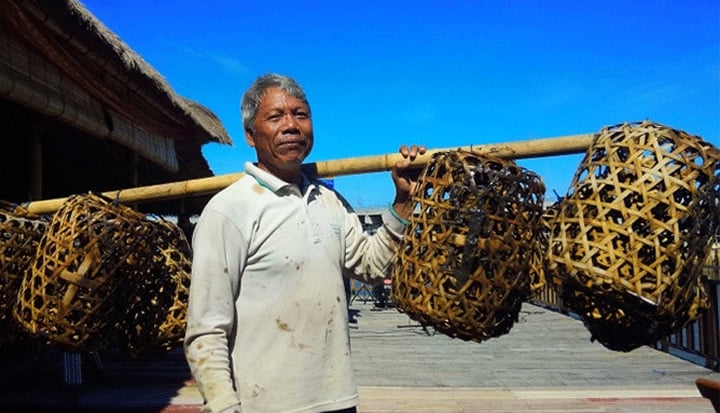Members of the Wansari Fishermen’s Association in Indonesia use enviornmentally friendly bamboo pens for crab cultivation in the mangroves (Credit: Kampoeng Kepiting)
The tourism sector grows fast, especially in developing countries
Tourism is one of the fastest growing industries worldwide. In 2012 alone, 1 billion tourists travelled across borders compared to 25 million in 1950. Currently, the World Tourism Organization (UNWTO) calculates that tourism is responsible for 9% of global GDP, for over 1 in 11 jobs, and for US$ 1.3 trillion in global exports annually. The industry is growing most quickly in emerging and developing countries, with compound annual growth rates of 4.4% expected.
The tourism industry and BoP communities rely on intact and attractive ecosystems
Many local communities depend on natural ecosystems to make their living. Often, ecosystems are areas of high biodiversity that harbor hundreds of different species of animals and plants that local communities use to create income generating opportunities through fishing, hunting & gathering, and the use of timber products.
Likewise, the tourism sector relies on intact and attractive ecosystems, such as forests, reefs, beaches. Natural ecosystems and biodiversity hotspots are part of many touristic offers. Every year, millions of hikers enjoy the fresh air in native forests and millions of scuba divers and snorkelers visit coral reefs. And hundreds of millions of tourists visit the beaches protected by these reefs.
Caribbean countries, for example, derive—on average—half of their gross domestic product from the tourism industry. In the Central American country of Belize, coral reef and mangrove-associated tourism contributes an estimated 12% to 15% of the country’s GDP.
In addition, demand for environmentally responsible tourism is significantly increasing and changing the very nature of the sector. With environmentally sustainable practices and close collaboration with local communities, companies can create new touristic products and services that attract the growing market segment of “conscious“ tourists.
Natural ecosystems reduce the exposure to climate related hazards
In addition to create income-generating opportunities for the tourism industry and BoP communities, natural ecosystems can also reduce their exposure to climate related hazards like droughts, hurricanes, tropical storms and tsunamis. Coral reefs, for example, function as natural buffers against tsunamis and tropical storms and reduce the impact of these hazards on the coastal zone. Mangrove forests form an effective natural barrier against storms and high tides. And native forests and natural vegetation can reduce the impacts of torrential rainfalls, flooding and landslides because of its slope stabilization and water regulation functions.
Tourism companies reduce exposure of BoP communities
Tourism companies can actively reduce the exposure of BoP communities against climate related hazards by protecting and rehabilitating natural ecosystems like forests, mangroves and coral reefs. Through sustainable cultivation, fishing and land management practices and proper waste disposal within these areas, companies can even create new employment opportunities for locals on top of that and use the local produce and materials for their resorts.
Though conservation agreements with landowners, tourism companies like Papua Expeditions share some of the monetary value created by the ecosystem with local communities and promote biodiversity protection and natural conservation.
Blue Ventures offers high-quality dive expeditions in Madagascar and Belize to volunteers from around the world that pay for the unique opportunity to get involved with Blue Ventures’ marine research and community conservation work. Blue Ventures rebuilds tropical fisheries and coral reefs together with coastal communities and demonstrates that effective costal management can improve food security and makes economic sense. They aim to reach over 3 million people from coastal communities by 2020.
Tourism companies increase adaptive capacity of BoP communities
By offering jobs, tourism companies can provide alternative or additional income sources for locals that reduce the pressure to overexploit their natural environments through deforestation, poaching or overfishing. People from BoP can work as tour guides, national park rangers or as cooking or cleaning staff in hotels and lodges.
The tourism enterprise Papua Expeditions offers birding and outdoor breaks in the tropical wilderness of west Papua. It employs local community members as guides, porters and cooks on the tours. Since most staff members join Papua Expeditions without formal training, the enterprise provides on-the-job training in birding, wildlife biology and English. These trainings sensitize participants and increase their knowledge on the support functions that these ecosystems have for their community.
Collaboration is key for effective adaptation
These examples show that close collaboration with local communities is essential for the on-going sustainability of natural conservation and adaptation measures. Sustainable local fishing practices or the protection of natural mangroves and forests only work if companies can include community members into the value creation and offer alternative or additional income sources.
A Crab Restaurant Protects Mangroves
The example of Kampoeng Kepiting Ekowisata Bali (Crab Village Ecotourism Bali), an Indonesian ecotourism business managed by a local fishermen’s association, shows that companies can increase the adaptive capacity of BoP communities and reduce the exposure of natural hazards at the same time. The story involves a restaurant that also offers water sports services and educational tours in the surrounding mangrove forest.
The company developed a sustainable method of crab cultivation that minimizes environmental damage of the mangrove forest. A restaurant sells the crabs to tourists, providing jobs in the kitchen and services. During educational boat tours, visitors can learn about the importance of mangrove as a natural habitat for many local species and see fishermen in action cultivating crab in a sustainable manner.
Environmental conservation has become an integral part of the company’s business strategy. The company is reducing the exposure and impact of natural hazards like tropical storms and floods though reforestation and conservation of native mangroves while simultaneously increasing the adaptive capacity of vulnerable communities by offering reliable jobs.
In our next blog post we will look closely how large companies in the food industry can support smallholder farmers to increase their climate resilience. Stay tuned.
This blog is part of a special series on Inclusive Business and Climate Change and has been published on Business Fights Poverty with the support of Citi Foundation










